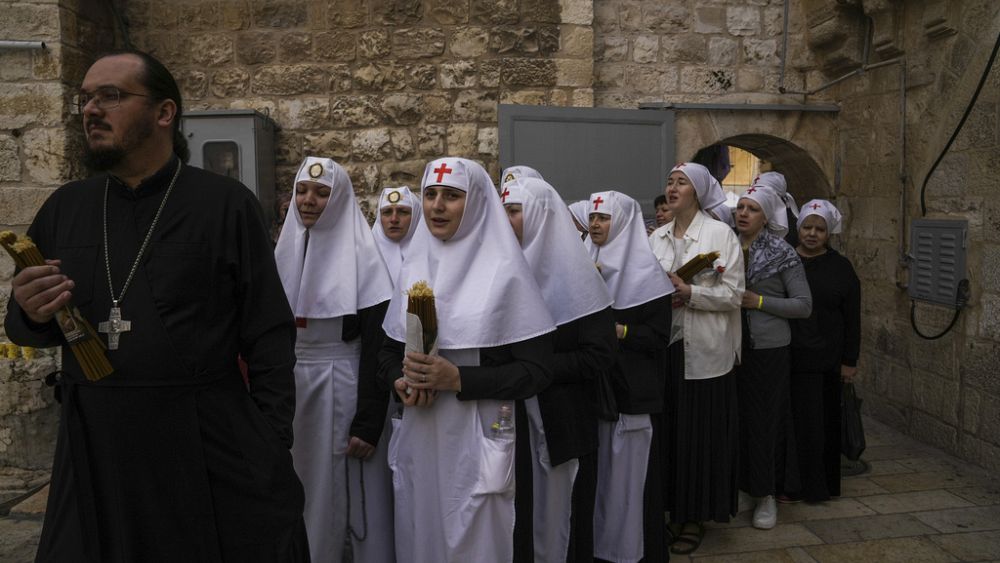
Christian worshippers thronged the Church of the Holy Sepulchre in Jerusalem on Saturday to celebrate the ceremony of the Holy Fire, an ancient, mysterious ritual that has sparked tensions this year with the Israeli police.
In the annual ceremony that has persisted for over a millennium, a flame — kindled in some miraculous way in the heart of Jesus’ tomb — is used to light the candles of fervent believers in Greek Orthodox communities near and far.
Little by little, the darkened church is irradiated by tiny patches of light, which eventually illuminate the whole building as the resurrection of Jesus is proclaimed. Chartered planes then ferry the flickering lanterns to Russia, Greece and beyond with great fanfare.
Authorities limit numbers to protect public safety
Many trying to get to the church — built on the site where Christian tradition holds that Jesus was crucified, buried and resurrected — were thrilled to mark the pre-Easter rite in the city where it all started. But others were disappointed.
“It is sad for me that I cannot get to the church, where my heart, my faith, wants me to be,” said 44-year-old Jelena Novakovic from Montenegro.
Israel has capped the ritual — normally an experience of being squeezed among multilingual, suffocating crowds — to just 1,800 people. The Israeli police say they must be strict because they’re responsible for maintaining public safety. In 1834, a stampede at the event claimed hundreds of lives. Two years ago, a crush at a packed Jewish holy site in the country’s north killed 45 people. Authorities say they’re determined to prevent a repeat of the tragedy.
But Jerusalem’s Christian minority — mired in the Israeli-Palestinian conflict and caught between Jews and Muslims — fear Israel is using extra security measures to alter their status in the Old City, providing access to Jews while limiting the number of Christian worshippers.
Angry pilgrims jostle with police
Israeli authorities and church officials have publicly quarrelled over the crowd constraints for the past week. As early as 8.00 am, Israeli police were already turning back most worshippers from the gates of the Old City — including foreign tourists who flew from Europe and Palestinian Christians who travelled from across the West Bank — directing them to an overflow area with a live stream.
Angry pilgrims and clergy jostled to get through while police struggled to hold them back, allowing only a trickle of ticketed visitors and local residents near the church. Metal barricades sealed off alleys leading to the Christian Quarter. Over 2,000 police officers swarmed the stone ramparts.
A few Palestinian teenagers from the neighbourhood saw a chance to make a buck, promising tourists they’d get them into the church for some 200 shekels (€49) but leading them only to a nearby courtyard before asking for more money.
Ana Dumitrel, a Romanian pilgrim surrounded by police outside the Old City, said she came to pay tribute to her late mother, whose experience witnessing the holy fire in 1987 long inspired her.
“I wanted to tell my family, my children, that I was here as my mom was,” she said, straining to assess whether she had a chance.
The friction over Saturday’s Orthodox Easter ritual has been fuelled in part by a rare convergence of holidays in Jerusalem’s bustling Old City. A few hundred metres away from the Church of the Holy Sepulchre, Muslims fasting for the 24th day of the holy month of Ramadan were gathering for midday prayers at the Al-Aqsa mosque, the third-holiest site in Islam. Earlier this week, tens of thousands of Jews flocked to the Western Wall for a mass prayer during the Passover holiday.
Israel captured the Old City, along with the rest of the city’s eastern half, in the 1967 Mideast War and later annexed it in a move not internationally recognised. Palestinians claim east Jerusalem as the capital of their hoped-for state.
Easter festivities across Europe
In Romania, many people have been travelling into the mountains to celebrate the Easter weekend. Some people chose the mountains, to enjoy skiing and tobogganing. Others prefer the pools with thermal water or the seaside. Many Romanians chose to spend Easter with their Bulgarian neighbours, south of the Danube, so they crossed the border.
Citizens burn saints and leave Easter eggs for health in the “St. Kliment Ohridski” Cathedral.
In North Macedonia, Friday was a day of mourning for the crucifixion of Jesus Christ. Citizens left Easter eggs at St. Kliment Ohridski Cathedral while praying for good health.
No bells were rung, instead wooden beams were struck. Believers of the Macedonian Orthodox Church are also expecting the arrival of the Holy Fire directly from Jerusalem.





